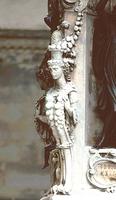Oh Mary, when we assume
 Today is Ferragosto and CoL premiered its first Ferragosto post in 2005. Salve, Diana, Mater Nostra!
Today is Ferragosto and CoL premiered its first Ferragosto post in 2005. Salve, Diana, Mater Nostra! Perhaps the best thing about being part of the Apostolic tradition is that it at least allows for a simulation of goddess worship if not actually accepting it, which on some levels it is. The last time a Pope used the power ex cathedra, i.e. infallibility was in 1950 to declare the doctrine of The Assumption and this date (August 15th) is observed worldwide by the world’s Roman Catholics as a holy day of obligation.
Papa Pacelli [Pius XII] proclaimed 55 years ago:
“Hence the revered Mother of God, from all eternity joined in a hidden way with Jesus Christ in one and the same decree of predestination, immaculate in her conception, a most perfect virgin in her divine motherhood, the noble associate of the divine Redeemer who has won a complete triumph over sin and its consequences, finally obtained, as the supreme culmination of her privileges, that she should be preserved free from the corruption of the tomb and that, like her own Son, having overcome death, she might be taken up body and soul to the glory of heaven where, as Queen, she sits in splendor at the right hand of her Son, the immortal King of the Ages.”
Connecting Mary to the ancient tradition of the Goddess is one of the easiest things to do for those in the know. It would take up a lot of time and space to do so here, but we’ll touch on it. At least we’ll connect this feast to Diana. Ferragosto in Italy which is celebrated this day – the ides of August – is the essential Summer Holiday. The major urban centers there virtually close down for the entire month of August – what a very civilized thing to do! It is ostensibly in honour of the Mother of God. Italy is ostensibly a Roman Catholic nation, yet this celebration goes deeper and farther than mere Xtian observance.
“In 18 BC the Roman Emperor Augustus declared that all of the month of August would be dedicated to the Feriae Augusti, a series of festivals and celebrations; the most important was held on the 13th, and was dedicated to Diana, the Goddess whose task it was to oversee the woods, the phases of the Moon, and Maternity. The services, which were celebrated in Diana's temple on the Aventine, was one of the few occasions in which Romans from all walks of life, masters and slaves alike, mingled freely, and the women, who made offerings to the Goddess throughout the year in the hope that their labor would be safe and happy, offered prayers to Lucina, the guise Diana assumed when she was acting as protectoress of Labor.”

“Aventine Hill, Diana's temple still had an ancient image that depicted her as a many-breasted mother of nature--similar to Diana of Ephesus. Women flocked to her temple at Aventine Hill to request aid in child bearing … Diana is complex and rich indeed: she was known as Diana Trivia: Diana on the earth, Luna in the sky, and Proserpine in the underworld. At her shrine at Nemi, near Aricia, she formed another trinity with her servant and assistant midwife, Egeria the water nymph, and Virbius, a woodland God. One of her epithets was Diana Nemorisis or Diana of the Grove. Diana's feast day … was deemed to be the birthday of the Goddess. Reportedly women would each bake a cake for the household in Diana's honor, around which white candles were set. A procession of women, with hounds on leashes, would journey to Aricia to offer thanks in Diana's sacred grove and request the Goddess's continued aid and a harvest free of storms. Diana's festival in mid August was a holiday for Roman slaves. Whole villages [in modern Italy] participate or watch the procession in which the image of the Virgin is carried through the streets.”

Gay women, (yay, liberated women universally) follow Diana as their mother and protector. The first John Paul, Papa Luciani, declared that we must not only think of God as our Father but also as our Mother. His papacy lasted only 34 days. Assume, good people, assume.

Comments